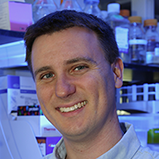A plenary lecture is featured both on Monday and Wednesday mornings during the ACT meeting.

Assistant Professor, Gene Therapy Center, University of North Carolina
Dr. Steven Gray earned his PhD in molecular biology from Vanderbilt University in 2006, after receiving a BS degree with honors from Auburn University. He performed a postdoctoral fellowship focusing on gene therapy in the laboratory of Jude Samulski at UNC. He is currently an assistant professor at UNC in the Department of Ophthalmology. He is also a member of the Gene Therapy Center and the Carolina Institute for Developmental Disabilities (CIDD).
Dr. Gray’s core expertise is in AAV gene therapy vector engineering, followed by optimizing approaches to deliver a gene to the nervous system or eye. His major focus is in AAV vector development to develop vectors tailored to serve specific clinical and research applications involving the nervous system or eye. These include the development of novel AAV capsids amenable to widespread CNS gene transfer or specialized ocular gene transfer. As AAV-based platform gene transfer technologies have been developed to achieve global, efficient, and in some cases cell-type-specific CNS gene delivery, his research focus has also included preclinical studies to apply these reagents toward the development of treatments for neurological diseases. Currently these include preclinical studies for Rett syndrome, giant axonal neuropathy (GAN), Tay-Sachs disease, Krabbe disease, Aspartylglucosaminuria, and Batten disease, and have expanded into human clinical studies to test a gene therapy approach for GAN.
Dr. Gray has published over 50 peer-reviewed papers in journals such as New England Journal of Medicine, Molecular Therapy, Nature Biotechnology, Gene Therapy, and The Proceedings of the National Academy of Sciences. He also has three pending patents. His research is funded by the National Institute for Neurological Disorders and Stroke, as well as numerous large and small research foundations. Dr. Gray was recently recognized with the 2016 Healthcare Hero award by the Triangle Business Journal, and his work on GAN was featured in a story by the CBS Evening News in 2015.
Title: Enabling Rare Disease Families to Drive the Development of Transformative New Treatments
Description: With the increasing use and sophistication of genetic testing, diagnosis of rare diseases is becoming faster and more accurate. Concurrently, technological advances are accelerating platform-based approaches to treat rare diseases, such as small molecule screening, monoclonal antibodies, gene therapy, or cell-based therapies. This convergence is creating a new paradigm for drug development, where emerging technologies are available to treat many rare diseases and families are, increasingly, receiving a diagnosis early enough in the disease progression to entertain the notion of developing a treatment for themselves or their children de novo. In the space of ultra-rare diseases (sometimes less than 100 cases known worldwide) families are increasingly faced with situations where a rational therapeutic strategy exists, but federal or industrial funding to drive the effort is understandably non-existent. Dr. Gray will present the example of his interaction with an organization called Hannah’s Hope Fund, which was founded in 2008 by parents to develop a treatment for giant axonal neuropathy. In six and half years, Hannah’s Hope and Dr. Gray developed a gene therapy approach which culminated in dosing of the first GAN patient in 2015, as part of a Phase I trial at the NIH Clinical Center. This effort, funded wholly by a small non-profit foundation, provides a roadmap for similar efforts to develop transformative gene therapy treatments for rare neurological diseases. Dr. Gray will provide additional examples of how other family-based foundations are using this roadmap to develop life changing gene therapies at an accelerated pace.

Distinguished Research Fellow, Immuno and Molecular Toxicology, Drug Safety Evaluation, Bristol-Myers Squibb Company
Helen has a broad level of expertise in immunotoxicology, and specialized scientific and regulatory knowledge and experience unique to the development and registration of biopharmaceuticals, providing DSE leadership for key biologic and immunologic assets. The Immuno and Molecular Toxicology Department, which Helen leads, has a multi-faceted knowledge base in immunotoxicology and molecular toxicology and strong technical expertise in protein therapeutic and small molecule drug development, with experience in program representation, study directing, and immunotoxicity, immunogenicity, molecular, and pharmacodynamic assay development and evaluation. As the DSE Therapeutic Area Head for Immunoscience, Helen provides scientific leadership, oversight and direction for all programs within her therapeutic area, and serves as an advisor for biopharmaceuticals across the therapeutic areas. Helen developed, executed, and defended the nonclinical safety assessment strategy leading to the successful approval of ORENCIA for rheumatoid arthritis and NULOJIX for kidney transplantation. Helen has significant experience in critical regulatory meetings including the preparation and conduct of two successful US FDA Advisory Committee Meetings. She was the PhRMA Deputy Topic Leader for the Expert Working Group that drafted the addendum to ICH S6 guidance on the nonclincial safety evaluation of biologics. Dr. Haggerty is Secretary of the BIOSafe Leadership Committee and a member of ILSI/HESI Immunotoxicology Technical Committee, American Association of Immunologists, and the Society of Toxicology. She has numerous publications in fields of immunotoxicology and drug development. Prior to joining Bristol-Myers Squibb in 1993, Helen received her BS in Biology from the University of Richmond, her PhD in Pharmacology/Toxicology from the Medical College of Virginia, and conducted her Postdoctoral Fellowship at the University of Pennsylvania, in the laboratory of Dr. John Monroe, studying B-cell signaling.
Title: Targeting Immune Checkpoints to Unleash the Immune System to Fight Cancer
Description: Although the immune system plays a critical role in controlling and eradicating cancer, cancer has developed multiple mechanisms to suppress the anti-tumor immune responses and evade its wrath including production of inhibitory cytokines, recruitment of immunosuppressive immune cells, and upregulation of co-inhibitory receptors known as immune checkpoints. After many years of trying to unleash the immune system to fight cancer, recent approvals of monoclonal antibodies targeting two immune checkpoints, cytotoxic T lymphocyte–associated antigen 4 (CTLA-4) and the programmed cell death protein 1 pathway (PD-1/PD-L1), as well as encouraging data emerging from clinical trials, have demonstrated durable responses against a wide array of tumor types and are transforming the way cancer is being treated. This lecture will discuss the preclinical rationale and clinical experience with these checkpoint inhibitors. Furthermore, while there have been many successes there also continues to be failures and thus strategies to increase their effectiveness such as combinations and biomarkers for patient selection will be discussed.
